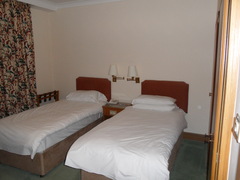Hoteliers who put guests’ lives at risk by playing fast and loose with fire regulations can expect severe punishment. In one case, the owner of a newly refurbished bed and breakfast who persisted in a series of flagrant breaches despite a number of warnings received a suspended prison sentence and a six-figure fine.
 Creation of the hotel from what was formerly a house in multiple occupation involved removing the building’s internal staircase and replacing it with a lift and an exposed external fire escape. Planning permission for the project was obtained, but building regulations approval was twice refused after local authority health and safety officers expressed concerns as to the adequacy of fire safety arrangements.
Creation of the hotel from what was formerly a house in multiple occupation involved removing the building’s internal staircase and replacing it with a lift and an exposed external fire escape. Planning permission for the project was obtained, but building regulations approval was twice refused after local authority health and safety officers expressed concerns as to the adequacy of fire safety arrangements.
The conversion work continued, however, and the owner was warned that, when the hotel opened, under no circumstances should any guests be accommodated other than on the ground floor. An inspection, however, revealed that two rooms on the upper floors, and one in the basement, were occupied. A van containing propane gas cylinders was also parked close to the external fire escape.
Inspectors also noted that neither the lift nor the fire escape was fire resistant and that the fire alarm system, although operational, was inaudible to those on the hotel’s upper storeys. The external fire escape led to a courtyard over which the owner had no right of way and to which the access route was locked.
In those circumstances, the owner pleaded guilty to four breaches of the Regulatory Reform (Fire Safety) Order 2005. He was sentenced to six months’ imprisonment, suspended for 18 months. He also received a £250,000 fine and was ordered to pay £14,210 towards the costs of his prosecution.
In ruling on his appeal against the sentences imposed, the Court of Appeal noted that, by his flagrant disregard of the law, the owner had placed guests at grave risk of serious injury or death. His attempts to blame others for the breaches were inapt as, by operation of the Order, he alone bore responsibility for fire safety on the premises. The offences had arisen through his poor business practices and the financial pressure he was under provided no excuse.
The owner’s appeals against the suspended prison sentence and costs order were dismissed. The Court nevertheless found that, in the light of his means and guilty pleas, the fine had been pitched somewhat too high and reduced it to £150,000.

